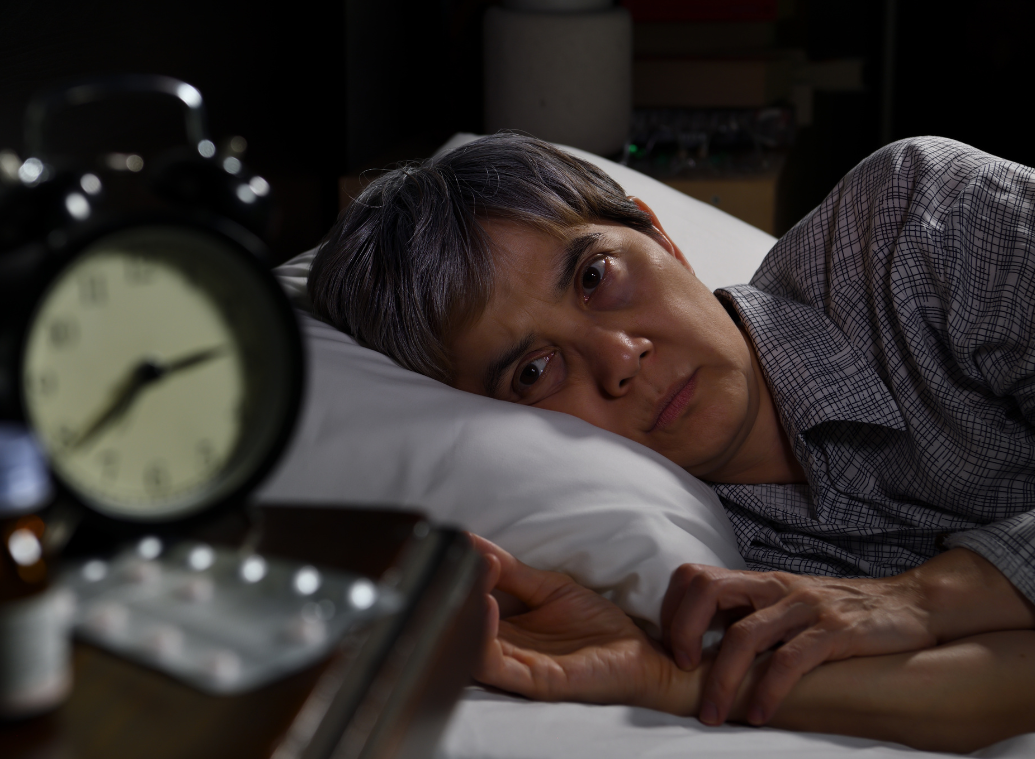Parkinson's disease: how can you improve your sleep?
Published Nov 24, 2025 • By Candice Salomé
Parkinson's disease is not limited to tremors and motor disorders. It also disrupts your nights, causing lack of sleep in many patients. Difficulty falling asleep, frequent awakenings, restless dreams... nights can become just as trying as days.
But why does Parkinson's disease have such a significant impact on sleep? What are the mechanisms involved and what can you do to get a better sleep? And above all, how can you maintain your quality of life despite difficult nights?
In this article, we explore the link between Parkinson's disease and sleep disorders, their impact on patients' health and the ways to battle these disorders and improve patients' quality of life.

What is Parkinson's disease?
Parkinson's disease is a progressive neurodegenerative disorder that primarily affects the central nervous system, particularly the dopamine-producing neurons. Dopamine plays an essential role in regulating movement and many brain functions. Its insufficient quantity causes the onset of motor disorders, such as tremors, rigidity, and slowness of movement, as well as non-motor symptoms, which are often overlooked. These include sleep disorders, chronic fatigue, anxiety, and cognitive impairment. Understanding Parkinson's disease therefore provides a better understanding of its impact on sleep quality and, more broadly, on patients' daily lives.
Understanding sleep disorders in people with Parkinson's disease
The most common sleep disturbances in Parkinson patients
People with Parkinson's disease frequently suffer from sleep disorders. Insomnia is one of the most common: it provokes difficulty falling asleep or frequent awakenings during the night. Sleep often becomes fragmented and unrefreshing, leaving the person feeling tired in the morning. Some patients also report vivid dreams or nightmares, as well as unusual behavior during REM sleep, such as moving or talking. These phenomena, known as REM sleep disorders, are characteristic of the disease and can be very disturbing for the patient and those around them.
Why does Parkinson's disease affect the way you sleep?
Sleep disorders in Parkinson's patients originate from several mechanisms. First, neurological dysfunction linked to dopamine deficiency influences sleep-wake cycles and disrupts sleep patterns. Added to this are the side effects of certain anti-Parkinson's treatments, which can cause insomnia or daytime sleepiness. Finally, chronic fatigue and disruption of the circadian rhythm further exacerbate these difficulties, creating a vicious circle in which lack of sleep accentuates the symptoms of the disease.
The impact of sleep disorders on the quality of life of people with Parkinson's disease
Physical and cognitive impact
Lack of quality sleep has a direct impact on the physical and cognitive health of those affected. Daytime fatigue, decreased concentration and difficulty performing certain tasks become common. Lack of rest can also aggravate motor symptoms, such as tremors or muscle rigidity. In the long term, it promotes the onset of mood disorders, such as irritability or anxiety, which are already common in Parkinson's disease.
Emotional and social impact
Sleep disorders are not limited to physical effects. They also have a profound impact on patients' personal lives. Feelings of isolation can increase, especially when night-time awakenings disrupt relationships. Frustration due to lack of rest, combined with fatigue, can sometimes make social interactions more difficult. These difficulties can create additional stress, weighing on morale and overall quality of life.
How to get a better sleep despite Parkinson's disease
Adjusting your sleep routine
Adopting good sleep hygiene can significantly improve the nights of patients with Parkinson's disease. Establishing a regular routine, with fixed bedtimes and wake-up times, helps the body regain a more stable rhythm. Practicing relaxation activities, such as meditation, deep breathing or reading before bedtime, promotes sleep. The layout of the bedroom is also essential: a calm, temperate environment without artificial light promotes more restful sleep.
Medical follow-up and correct treatment plan
Regular medical monitoring is essential to assess the nature of sleep disorders and adjust treatments. A neurologist or sleep specialist can suggest appropriate solutions, such as adjusting the timing of anti-Parkinson's medication, prescribing specific treatments for insomnia, or implementing behavioral therapies. In some cases, complementary approaches such as light therapy or relaxation techniques may also help regulate sleep-wake cycles.
Everyday tips for people with Parkinson's disease
How to manage night-time awakenings
Waking up during the night is common, but it can be better managed with a few simple steps. It is recommended to stay calm, avoid looking at the clock, and practice a few slow breathing exercises before going back to bed. Some people find it helpful to take micro-naps during the day to compensate for lack of sleep at night. Gentle and regular physical activity during the day can also promote more natural sleep at night.
Maintaining good quality of life despite Parkinson's disease
Even though sleep disorders are an integral part of Parkinson's disease, it is possible to maintain a good quality of life. Planning important activities for times when fatigue is least prevalent helps to better manage energy on a daily basis. Prioritizing rest, relaxation and stress management contributes to a better overall balance. Creating a soothing night-time environment, with reassuring landmarks and an atmosphere conducive to sleep, helps to make nights more peaceful.
This is important!
- Parkinson's disease often causes sleep disorders: insomnia, fragmented sleep, nightmares or night-time agitation.
- These disorders are linked to dopamine loss, treatment side effects and disruption of the circadian rhythm.
- Lack of sleep exacerbates fatigue, motor disorders and anxiety.
- Good sleep hygiene, relaxation techniques and appropriate medical care can help restore peaceful nights.
- Even though these disorders are part of the disease, it is possible to improve quality of life by adopting simple measures and receiving appropriate support.
Was this article helpful to you?
Give it a “Like” and share your thoughts and questions with the community in the comments below!
Take care!
Sources :
Les Troubles du Sommeil, France Parkinson
La maladie de Parkinson et les troubles du sommeil, Parkinson Canada
Y. Ouahmane, J. Mounach, A. Satté, A. Zerhouni, A. Bourazza, H. Ouhabi, Troubles du sommeil dans la maladie de Parkinson, et intérêt de la polysomnographie, NPG Neurologie - Psychiatrie - Gériatrie, Volume 18, Issue 106, 2018, Pages 245-255, ISSN 1627-4830, https://doi.org/10.1016/j.npg.2018.04.006.
Le traitement par L-Dopa diminue les troubles du sommeil liés à la maladie de Parkinson, Inserm
Une structure cérébrale fait le lien entre troubles du sommeil et de la posture dans la maladie de Parkinson, Institut du Cerveau
Comments
You will also like

Aggression in Parkinson's disease patients: causes, manifestations and solutions
Apr 17, 2024 • 7 comments

Parkinson's disease: "The disease progresses, but I am and will be stronger than it!"
Jan 12, 2022 • 6 comments

Parkinson's disease: "I managed to reverse the progress of my Parkinson's disease".
Feb 5, 2021 • 8 comments

 Facebook
Facebook Twitter
Twitter